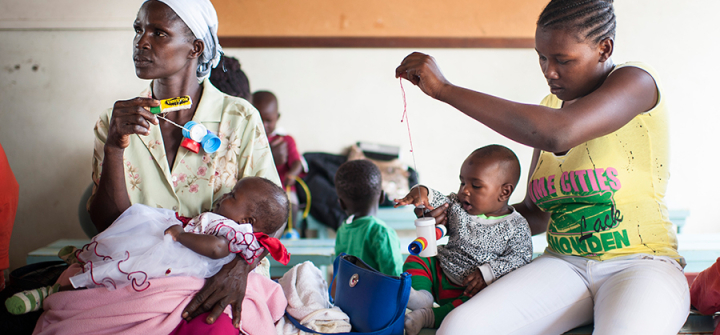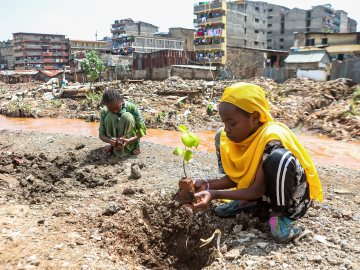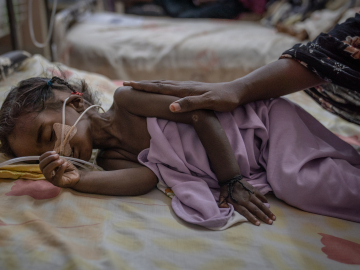Change the Early Years, Transform a Child’s Life
Many governments count on preschool to provide the nurturing care disadvantaged children need for healthy development. But for too many children, particularly in low-resource countries, preschool is too late.
That’s where healthcare workers—often the first and only service providers who regularly interact with children under 3 and their caregivers during those important early years—can fill a critical gap.
Elizabeth Oyaro, a grandmother of 5 in Kenya’s Siaya County, understands the importance of nurturing care. Patiently molding clay animals for her grandchildren in front of her family’s home, she explains, “Playing with children helps them develop knowledge. When you play with a child, you educate them.”
Three decades of scientific evidence back Elizabeth up. The human brain develops most rapidly early in life, creating more than one million neural connections in just the first few years. Early experiences, especially before the age of 3, can build either a strong or a fragile foundation for later development. During this critical window of opportunity, children must receive “nurturing care”—including good health, adequate nutrition, safety and security, responsive caregiving, and opportunities for early learning—in order to develop to their full potential.
Unfortunately, stress in early childhood, often caused by extreme poverty and malnutrition, can be toxic to the developing brain. Worldwide, 250 million children under 5 remain at risk of suboptimal development. However, even in low-resource settings, the health system can play a critical role in reaching the youngest children with services that promote nurturing care for early childhood development..
This is true in Siaya County, where healthcare workers now counsel caregivers on playing and talking with their children. They also screen children for developmental delays, discuss important milestones for caregivers to track, and provide messages about nutrition. Through routine health services—including antenatal and postnatal care, child immunizations, pediatric services, and community-based interventions—caregivers are learning how to respond holistically to their child’s physical, emotional, social, and cognitive needs.
Betty Nakhungu, a nurse in Siaya, now encourages mothers to connect with their children through play, responsive caregiving, and stimulation. “I take a long time discussing [what a child needs] with the mother, and through that, I’m able to understand the problems she’s going through at home and help her come up with a proper plan to take care of her child,” Betty says. Promoting nurturing care has also changed her own approach to motherhood. Of her 2 children, she says, “I’ve been monitoring their milestones and stimulating their senses.”
Supporting early childhood development is critical for individuals, families, and countries. And the economic cost of inaction is steep—children who experience developmental delays early in life are estimated to forfeit a quarter of average adult income per year. These losses may cost countries up to twice their current gross domestic product spent on health. Yet the majority of countries do not have policies in place that outline each sector’s role in holistically caring for the child.
The WHO, UNICEF, the World Bank and collaborating partners recently launched the Nurturing Care for Early Childhood Development Framework to support countries to improve the lives of children and bolster their economies. The framework describes a comprehensive government-led approach to scale up nurturing care for children under 3 through evidence-based policies and programs.
Siaya County is already paving the way. Led by the governor, the county is integrating nurturing care into health policies, training health workers, and coordinating the various sectors and partners involved in delivering services. It is key for other governments to take similar actions in integrating nurturing care into the health system.
This global movement—and promotion of nurturing care already happening in countries around the world—is recognition that when we change a child’s early years, we can change their whole lives.
Matthew Frey is the associate director of the Maternal, Newborn, and Child Health and Nutrition Program at PATH, a global team of innovators working to accelerate health equity so all people and communities can thrive. Matthew leads PATH’s Global Integrated ECD/Nurturing Care Program, which currently supports the scale-up of health systems–based early childhood development services in Côte d’Ivoire, Kenya, Mozambique, and Zambia.
Join the tens of thousands of subscribers in more than 100 countries who rely on Global Health NOW summaries and exclusive articles for the latest public health news. Sign up for our free weekday enewsletter, and please share the link with friends and colleagues: http://www.globalhealthnow.org/subscribe.html
Caretakers in Kenya playing with children in a health facility waiting room (using toys made from locallly available materials). Image courtesy of the Conrad N. Hilton Foundation/Joop Ruben




